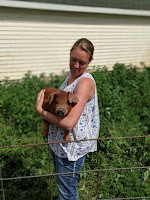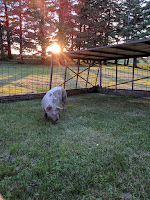 Now that fall has officially killed off summer with it's snow, it's time to reminisce about the balmy sunny weather and the no time for sickness attitude. The smell of rain coming or going to the garden to get supper or catching butterflies are just a few of my summer favorites. However, I can think of many more.
Now that fall has officially killed off summer with it's snow, it's time to reminisce about the balmy sunny weather and the no time for sickness attitude. The smell of rain coming or going to the garden to get supper or catching butterflies are just a few of my summer favorites. However, I can think of many more.Like most people, vacation is my favorite. For us, vacation is what kicked off our summer with a trip to Pennsylvania for my niece's graduation. On the way, we stopped at Cedar Point, Ohio to enjoy the many roller coasters for my older boys and Snoopyland for my younger two. The Lake Erie beach was a bonus.
 But before we could take our vacation across the country, we had to prepare our farm. With careful planning, our first batch of 100 broilers (meat birds) were already harvested and in the freezer along with our pigs. Then, chores were a breeze for our friends that were taking care of our laying hens and shed cats.
But before we could take our vacation across the country, we had to prepare our farm. With careful planning, our first batch of 100 broilers (meat birds) were already harvested and in the freezer along with our pigs. Then, chores were a breeze for our friends that were taking care of our laying hens and shed cats. Back from vacation meant more animals, which is always fun and exciting. This year, our pigs got the pleasure of being in a pig tractor, which was a 16' x 16' pen moved to new grass every couple of days. Our free range laying hens followed the pig tractors to help clean up after them. Our broilers enjoyed new chicken tractors too. This was the summer for experimenting with new ideas, which is always my favorite.
Back from vacation meant more animals, which is always fun and exciting. This year, our pigs got the pleasure of being in a pig tractor, which was a 16' x 16' pen moved to new grass every couple of days. Our free range laying hens followed the pig tractors to help clean up after them. Our broilers enjoyed new chicken tractors too. This was the summer for experimenting with new ideas, which is always my favorite. The new animal we added this summer were the turkeys. I was a little disappointed at first. I had grand plans for this majestic bird frolicking through the grass, and it ended up being scared of our free range chickens instead. However, their calls won me over or as my son likes to say, "Callin the turkeys." My son would walk out onto the porch and yell, "Tuuurrrrkeeey!" The turkeys would then give their chorus of gobbles in reply. This went on for months, which was my favorite part.
The new animal we added this summer were the turkeys. I was a little disappointed at first. I had grand plans for this majestic bird frolicking through the grass, and it ended up being scared of our free range chickens instead. However, their calls won me over or as my son likes to say, "Callin the turkeys." My son would walk out onto the porch and yell, "Tuuurrrrkeeey!" The turkeys would then give their chorus of gobbles in reply. This went on for months, which was my favorite part.All these animals supported our first Farmer's Market venture. From May to October on Wednesday nights and Saturday mornings you would find us selling pork, chicken, eggs, chicken feet dog treats, lard soap, lettuce, onions, radishes, and cherry tomatoes. Talking directly to consumers was truly eye opening, but such a great experience.

 This years garden also added to our farmer's market booth. With plans in place from March, we were able to double crop potatoes, radishes, carrots, and lettuce. We added a pumpkin patch which was needed to break up the soil and control weeds in last years pig pen. Watching everything grow and having the kids eat directly out of the garden was great, but my absolute favorite was when we could look at our dinner plate and see that everything came from our three acres of land. I pulled the last carrots out of the garden only yesterday, so I still look forward to that sense of accomplishment in our food. The taste of summer will live on throughout the winter.
This years garden also added to our farmer's market booth. With plans in place from March, we were able to double crop potatoes, radishes, carrots, and lettuce. We added a pumpkin patch which was needed to break up the soil and control weeds in last years pig pen. Watching everything grow and having the kids eat directly out of the garden was great, but my absolute favorite was when we could look at our dinner plate and see that everything came from our three acres of land. I pulled the last carrots out of the garden only yesterday, so I still look forward to that sense of accomplishment in our food. The taste of summer will live on throughout the winter.




















